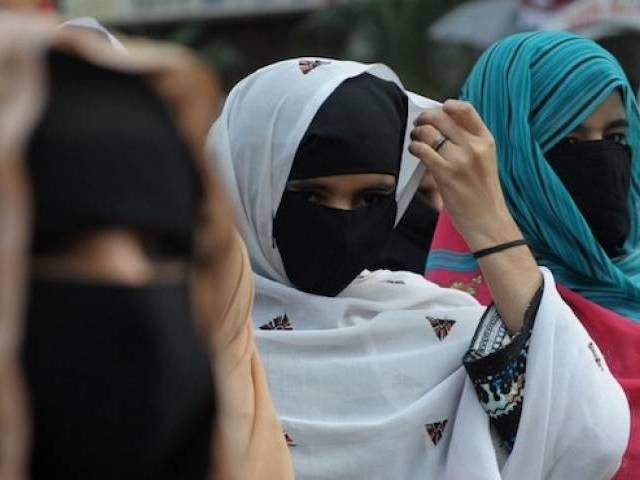Women protection law: Govt agrees to include family members in arbitration
Religious leaders asked to brief clerics about government’s view of the law

PHOTO: AFP
A committee formed to consult religious scholars on the Punjab Protection of Women against Violence Act held its first meeting on Monday.
The scholars attending the meeting were assured that their concerns over the language used in the translation of the bill would be addressed.
Law Minister Rana Sanullah, who is heading the committee, said that comprehensive rules would be drafted for the Act to clarify all concerns raised about it. He said the rules would be shared with the scholars for their review.
Regarding concerns over use of a GPS-enabled anklet, Special Monitoring Unit’s Senior Member Salman Sufi said it would be used only in cases where there was a threat of grave violence (sexual assault or murder) or where petitioners were being threatened to withdraw their cases. He said a court of law would determine the level of threat. He said the gadget would be designed in a manner that it would remain hidden from view. He said with advancements in technology the size of the GPS-tracker could be quite small. “The purpose is to track the movement of the defendant. It will not be used in the case of a husband living in the same house,” he said.
He said the tracker could be used in cases where the couple had been divorced and the woman had received a threat from the former husband.
The law minister said 48 hours was the longest a person would be required to wear the tracker. He said the district women protection committee would determine the length of time a defendant would be required to wear the tracker on a case-by-case basis.
Salman Sufi said there were no provisions in the Act prohibiting men from asking their women relatives about their whereabouts. “A man asking his daughter or wife about such a thing does not constitute psychological violence,” he said.
He said the courts and the police were responsible for verifying the authenticity of petitions filed under the Act and that there was no need to be concerned about its misuse. He said the Act prescribed penalties for those found registering false FIRs under the Act.
On suggestion of some scholars, the government agreed to include in the arbitration committee a member each from the husband and wife’s families. Sufi said the district women protection committee (DWPC) already included four non-official members.
Sanaullah concluded the meeting by assuring the gathering that no provisions in the Act were in violation of Islamic teachings. He encouraged the scholars to study the Act carefully. He said the committee should recommend improvements to ensure that efforts for ending violence against women could be strengthened. He also requested the audience to brief other scholars and clerics about the government’s viewpoint on the Act.
The meeting was attended by Hafiz Tahir Ashrafi of the Pakistan Ulema Council; Dr Raghib Naeemi of Jamia Naemia; Zahid Muhammad Qasmi, a member of the Concil of Islamic Ideology; Allama Arif Wahidi; Hafiz Kazim Raza; Maulana Muhammad Khan; Mulana Yousaf Anwar; Maulana Muhammad Amjad; Maulana Muhammad Amjad; Pir Mehfooz and Mufti Qavi.
Published in The Express Tribune, March 15th, 2016.



















COMMENTS
Comments are moderated and generally will be posted if they are on-topic and not abusive.
For more information, please see our Comments FAQ